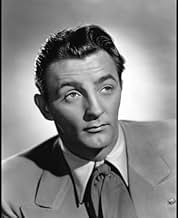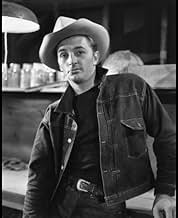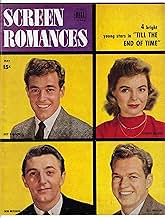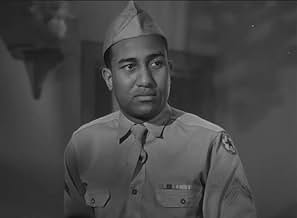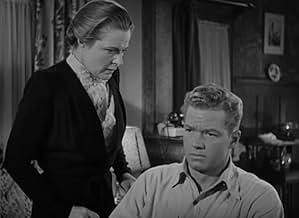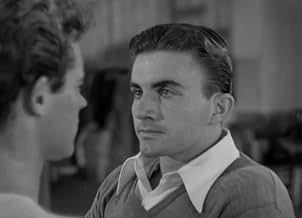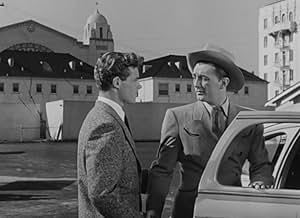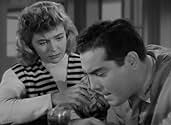IMDb RATING
6.7/10
1.7K
YOUR RATING
Drama about former WW2 Marines readjusting to civilian life and dealing with their mental and physical traumas.Drama about former WW2 Marines readjusting to civilian life and dealing with their mental and physical traumas.Drama about former WW2 Marines readjusting to civilian life and dealing with their mental and physical traumas.
- Awards
- 4 wins total
Harry von Zell
- Scuffy
- (as Harry Von Zell)
John Bailey
- Interviewer
- (uncredited)
Bobby Barber
- Arcade Game Player in Saloon
- (uncredited)
Bill Barnum
- Jackson
- (uncredited)
Dick Benjamin
- Sergeant
- (uncredited)
Paul Birch
- Marine Wanting Farm
- (uncredited)
- Director
- Writers
- All cast & crew
- Production, box office & more at IMDbPro
Featured reviews
The year after World War II ended brought the first dramas to look at the plight of returning veterans trying to readjust to civilian norms. The Best Years of Our Lives was the big hit that year, but there were others, too. The title song in Till The End of Time, which was adapted from a Chopin polonaise, snakes through the movie wearing many skins, from saraband to Swing, constituting one of the more effective leitmotifs of 40s-movie scores. The story centers on Guy Madison, returning from the Pacific to his Los Angeles family. His parents expect the boy who left, not the man (physically, at least) who came back; they recoil when he wants to share his experiences in battle. So he starts to rebel against their sheltered and complacent life but has little idea of what to do with his own.
His love life is riven as well. One the one side there's the brash bobby-soxer next door, symbolizing what he used to be; on the other is weary war-widow Dorothy McGuire (among her most affecting roles), another survivor of the horrors of combat.
It's tempting to assume that Madison landed this meaty role (he's constantly on screen) solely because of his looks -- extraordinary, even by Hollywood standards. But he delivers a natural, if a bit bashful, performance. Only when buddy Robert Mitchum resurfaces halfway through the movie does he suffer by comparison. As a black sheep with a steel plate in his skull, Mitchum strikes the sparks that would ignite his long stardom; Madison, while pleasant and competent, comes up with nothing new and starts to grow monotonous (his career took him to TV westerns and European cheapies).
Director Edward Dmytryk (Murder, My Sweet; Back to Bataan) tones down for this leisurely character study, which remains absorbing and at times close to moving. He missteps once, very near the end, when a blast at bigotry comes flying out of left field, and he probably had to settle for the upbeat ending the studio wanted. But it was left to film noir, which dealt with similar issues obliquely (Blue Dahlia, Act of Violence, Dmytryk's own Crossfire) that probed them more profoundly.
His love life is riven as well. One the one side there's the brash bobby-soxer next door, symbolizing what he used to be; on the other is weary war-widow Dorothy McGuire (among her most affecting roles), another survivor of the horrors of combat.
It's tempting to assume that Madison landed this meaty role (he's constantly on screen) solely because of his looks -- extraordinary, even by Hollywood standards. But he delivers a natural, if a bit bashful, performance. Only when buddy Robert Mitchum resurfaces halfway through the movie does he suffer by comparison. As a black sheep with a steel plate in his skull, Mitchum strikes the sparks that would ignite his long stardom; Madison, while pleasant and competent, comes up with nothing new and starts to grow monotonous (his career took him to TV westerns and European cheapies).
Director Edward Dmytryk (Murder, My Sweet; Back to Bataan) tones down for this leisurely character study, which remains absorbing and at times close to moving. He missteps once, very near the end, when a blast at bigotry comes flying out of left field, and he probably had to settle for the upbeat ending the studio wanted. But it was left to film noir, which dealt with similar issues obliquely (Blue Dahlia, Act of Violence, Dmytryk's own Crossfire) that probed them more profoundly.
No need to repeat the plot. That scene where Pat (McGuire) and Cliff (Madison) encounter the shell-shocked outpatient is genuinely disturbing. For a screenplay, that's a tough problem to treat in a single set-up. Pat's little anecdotal lesson works pretty well-- the soldier is relieved of his demons for the moment. But for how long, I wonder. And what will become of him, sitting alone, quaking, and afraid to go home. And how many others will come home like him. The script says the inner wounds will wear off eventually, but then it had to say something like that, otherwise the movie's hopeful tone would be compromised. And that would be counter to what the country needs following four years of horror.
It' a decent, earnest movie, produced by the studio's (RKO) head honcho Dore Schary, so it's a prestige production. Looks like they took a gamble on an unknown Guy Madison in the lead role. He certainly looks the part—I can just about hear the echoing squeals of bobby- soxers even 60 years later. He does bring an earnestness that's refreshing, even if his range is pretty limited as the heavier scenes show. Newcomers Mitchum and the underrated Bill Williams also register, along with the dewy-eyed Dorothy McGuire before she became a favorite movie mom. But I especially like Jean Porter's vivacious teenager. It's really her Helen who projects the buoyant spirit of the coming consumer age.
There were, of course, a number of these "adjustment" films as the country struggled with a return to normalcy. Where this movie excels is with the uncertainty of a recovering civilian world. Each main character is drifting as a result of the war. Each has been changed and must now work out how to fit back in. Then too, I like the rather ambivalent way the movie ends, avoiding easy solutions.
There's one other sequence worth noting. The barroom brawl is both over-done and clumsily staged. Nonetheless, it makes an important point. Namely, that the war has changed society as well as individuals. A post-war America will be more inclusive than the traditional America. The logic appears to be that since it took everyone to win the war, no one should be excluded from the fruits. Given the civil rights movement soon to emerge, the movie thus proves prophetic. Too bad this worthy movie effort now seems so obscure. Despite the years, it remains an affecting look at a key period in American life and merits catching up with.
(In passing—that's filmmaker Blake Edwards of Pink Panther fame as the shop foreman that Cliff tangles with, soon to become a screenwriter, and then an A-picture producer-director.)
It' a decent, earnest movie, produced by the studio's (RKO) head honcho Dore Schary, so it's a prestige production. Looks like they took a gamble on an unknown Guy Madison in the lead role. He certainly looks the part—I can just about hear the echoing squeals of bobby- soxers even 60 years later. He does bring an earnestness that's refreshing, even if his range is pretty limited as the heavier scenes show. Newcomers Mitchum and the underrated Bill Williams also register, along with the dewy-eyed Dorothy McGuire before she became a favorite movie mom. But I especially like Jean Porter's vivacious teenager. It's really her Helen who projects the buoyant spirit of the coming consumer age.
There were, of course, a number of these "adjustment" films as the country struggled with a return to normalcy. Where this movie excels is with the uncertainty of a recovering civilian world. Each main character is drifting as a result of the war. Each has been changed and must now work out how to fit back in. Then too, I like the rather ambivalent way the movie ends, avoiding easy solutions.
There's one other sequence worth noting. The barroom brawl is both over-done and clumsily staged. Nonetheless, it makes an important point. Namely, that the war has changed society as well as individuals. A post-war America will be more inclusive than the traditional America. The logic appears to be that since it took everyone to win the war, no one should be excluded from the fruits. Given the civil rights movement soon to emerge, the movie thus proves prophetic. Too bad this worthy movie effort now seems so obscure. Despite the years, it remains an affecting look at a key period in American life and merits catching up with.
(In passing—that's filmmaker Blake Edwards of Pink Panther fame as the shop foreman that Cliff tangles with, soon to become a screenwriter, and then an A-picture producer-director.)
After seeing the book Heartthrobs in the bookstore I was dying to see the beautiful man on the cover actually moving and speaking. Guy Madison is absolutely the most beautiful person that I have ever seen, male or female. Looking at him is truly like staring at a piece of art. It's no wonder some casting director thought to himself "the world needs to see this man 30 feet high" - the camera cannot seem to catch this guy at a bad angle. Guy is not the best actor you'll come across, but he is charming and earnest and hey his co-stars are Robert Mitchum and Dorothy McGuire so check it out! Dorothy's a fine actress, but a little matronly in this one - she's seems more like Guy's mother than a suitable love interest. If only they'd given her better ensembles - there's one scene with her in slip and much to my surprise she had a lovely little figure hiding under those awful jackets.
This takes one back to the end of WWII when GIs were being released from service and coming home to dubious situations.
Confused, disoriented, and restive, these ex-service men were suddenly thrust into lifestyles for which they were unprepared. From holding a bayoneted rifle to pushing a pencil, the transition was abrupt and strange.
Many drifted into and out of relationships, while others took to the bottle as a form of escape. "Till the End of Time" dramatizes a few of these plights with some interest.
Cast in the lead role was Guy Madison, newly "discovered" by Henry Willson and David O. Selznick for a snippet but memorable scene in "Since You Went Away" (and shot quickly while Madison was on navy leave). After being mustered out of the service a couple of years later, Hollywood was eagerly waiting to cast him in what really amounted to his first feature (barring the earlier "cameo"). Unfortunately it was a starring role.
That was a pity, for the young "find" needed small vehicles in which to mature and grow in the profession. That he comes off as well as he does here is commendable, yet it does him a great disservice. Guy's reedy, inconsistent, and even amateurish looking--qualities that would have been honed and polished, had he the sensitive career management other similar "discoveries" were afforded.
Having his greatest weaknesses so exposed in a lead part, Madison was "written off" for other starring roles, and pushed into routine westerns--where he more or less remained for the rest of his career. However, his appearance in some seven dozen radio, television and movie parts ain't especially hay. And while he may not have been considered the greatest actor, he did make an honest living that put food on the table for the rest of his life.
His costars here are the excellent Robert Mitchum and Dorothy McGuire, and they certainly help bolster the proceedings. All in all, "Till the End of Time" is an interesting drama, and Guy Madison's most notable vehicle.
The pop adaptation of Chopin's "Polanaise" played throughout doesn't hurt.
Confused, disoriented, and restive, these ex-service men were suddenly thrust into lifestyles for which they were unprepared. From holding a bayoneted rifle to pushing a pencil, the transition was abrupt and strange.
Many drifted into and out of relationships, while others took to the bottle as a form of escape. "Till the End of Time" dramatizes a few of these plights with some interest.
Cast in the lead role was Guy Madison, newly "discovered" by Henry Willson and David O. Selznick for a snippet but memorable scene in "Since You Went Away" (and shot quickly while Madison was on navy leave). After being mustered out of the service a couple of years later, Hollywood was eagerly waiting to cast him in what really amounted to his first feature (barring the earlier "cameo"). Unfortunately it was a starring role.
That was a pity, for the young "find" needed small vehicles in which to mature and grow in the profession. That he comes off as well as he does here is commendable, yet it does him a great disservice. Guy's reedy, inconsistent, and even amateurish looking--qualities that would have been honed and polished, had he the sensitive career management other similar "discoveries" were afforded.
Having his greatest weaknesses so exposed in a lead part, Madison was "written off" for other starring roles, and pushed into routine westerns--where he more or less remained for the rest of his career. However, his appearance in some seven dozen radio, television and movie parts ain't especially hay. And while he may not have been considered the greatest actor, he did make an honest living that put food on the table for the rest of his life.
His costars here are the excellent Robert Mitchum and Dorothy McGuire, and they certainly help bolster the proceedings. All in all, "Till the End of Time" is an interesting drama, and Guy Madison's most notable vehicle.
The pop adaptation of Chopin's "Polanaise" played throughout doesn't hurt.
I would make the case that Guy Madison may be the best-looking young man to ever star in a feature film, and this is his best one. There are moments where his totally unselfconscious looks are just jaw-dropping. His acting, on the other hand, can be described charitably as "natural"; but I wasn't expecting Lawrence Olivier. Guy was an early find of legendary Hollywood agent Henry Willson, who would later "discover" a tall young man whom he renamed Rock Hudson.
Did you know
- TriviaJean Porter and Edward Dmytryk met during the making of this film and would be married in 1948, until his death in 1999.
- GoofsOn the bus arriving at the Marine base at the beginning, California is misspelled "Caliornia."
- Quotes
Cliff Harper: You look awful!
William Tabeshaw: You look cute...
Cliff Harper: Come on in the house and we'll have a beer!
- ConnectionsFeatured in Hollywood the Golden Years: The RKO Story: Dark Victory (1987)
- SoundtracksTill the End of Time
by Buddy Kaye and Ted Mossman, based on Chopin's "Polonaise"
Music by Frédéric Chopin (uncredited)
- How long is Till the End of Time?Powered by Alexa
Details
- Release date
- Country of origin
- Language
- Also known as
- Hasta el fin del tiempo
- Filming locations
- Production companies
- See more company credits at IMDbPro
- Runtime
- 1h 45m(105 min)
- Color
- Aspect ratio
- 1.37 : 1
Contribute to this page
Suggest an edit or add missing content

